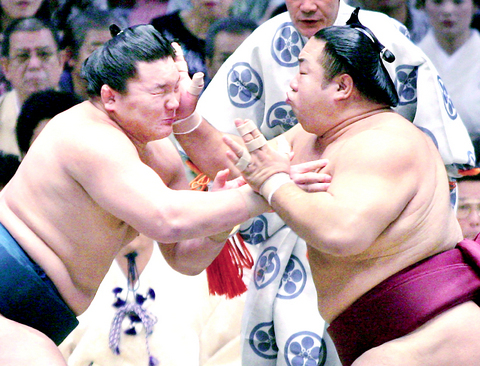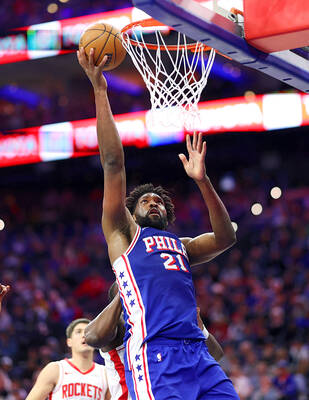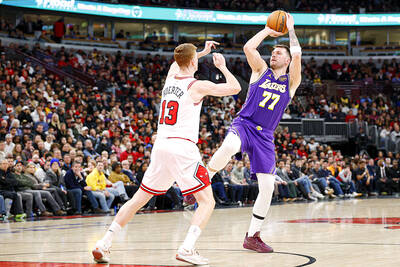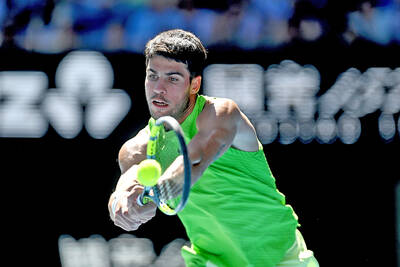Japan's proud national sport, sumo, has more to it than just putting two large, semi-naked people in a ring and have them try to push each other, they say.
"People think it's so easy, but they should try it and see for themselves how difficult it is," Kotooshu, the first European to ever proceed to the second-highest rank of sumo in Japan, explained.
Kotooshu incorporated the techniques particular to sumo in his Western wrestling skills. Within three years and two months, the Bulgarian native climbed the ladder to the second-highest rank of ozeki in Japan.

PHOTO: AFP
But Kotooshu was shocked to see conventional discipline dominating Japan's national sport in the 21st century. He expected to train with state-of-the-art equipment, he said.
"`What in the world is this?' was honestly my first impression," the wrestler said in Japanese after routine training one morning. "You can get arrested for doing that [caning] in other countries."
About 30 large, naked men in their beige loin cloths stood and observed a lower rank member tackling his practice partner head-on during the training.
Before breakfast at around 6am, the members come down from their dormitory rooms to the practice ground with a ring made of rope.
It's a sacred place where they are engulfed with energy. Not even whispers are heard. The only noises are loud panting, wheezing of the wrestlers' lungs and occasional caning on their legs.
Cued by the stable master and trainers mumbling in their rough voices, senior wrestlers would slap or blow water on a junior member being trained.
Kotooshu was no exception. He says he was caned on his thigh three times before he became ozeki. He couldn't protest because of his language ability.
But he believed that endurance makes perfect and built up his strength.
When Japan's national sport was risking a loss in popularity, foreign wrestlers like Kotooshu joined the industry and appeared on TV, saving sumo from retreating into the background.
As the number of non-Japanese sumo began to rise in 2000, the sport has regained its fame and fans. And Kotooshu has contributed to the boost in popularity.
The ozeki, born as Kaloyan Stefanov Mahlyanov, stands tall at 2.03m and slim at 147kg, unlike classic sumo wrestlers whose stomach extends out and thighs sag.
The young Bulgarian wrestler was scouted by a sumo federation in his home country before traveling half way around the world.
Nicknamed "Gentle Giant," Kotooshu likes to sleep in, go out for dinners and to movies with friends on his days off.
But the man who loves sports and chose sumo as his life's vocation wants to spread the fascination of sumo around the world.
Sumo is barely keeping its quota with the entry of foreign nationals into the field, because very few Japanese young people show interest in it.
Currently, Mongolian athletes are in the majority among 12 non-Japanese nationalities.
Although the Sumo Association limits its 54 stables to accepting one foreign national, Kotooshu thinks the game needs more promotion abroad and can appeal to the world as an international sport just like judo.
just one win
Grand champion Asashoryu was only one win away from the championship yesterday, defeating Kaio to stay in sole lead at the Nagoya Grand Sumo tournament.
In the day's final bout at Aichi Prefectural Gymnasium, Mongolia-born Asashoryu quickly got a firm hold on the ozeki's belt to shove him out of the ring and into the stands.
Asashoryu's record improved to 13-0 -- one win away from clenching the championship -- while Kaio fell to 8-5.

The Philadelphia 76ers, fueled by 36 points from Tyrese Maxey and a triple-double from Joel Embiid, on Thursday beat the Houston Rockets 128-122 in an NBA overtime thriller. Cameroonian big man Embiid scored 32 points, grabbed 15 rebounds and handed out 10 assists, posting the ninth triple-double of his career to help the Sixers end the Rockets’ three-game winning streak. Rockets star Kevin Durant scored 36 points and Amen Thompson added 17, but Thompson was scoreless in the fourth quarter. Even so, the Rockets led by nine midway through the final frame, Maxey tying it at 115-115 with 40.1 seconds left. Durant missed a

Luka Doncic on Monday produced a 46-point masterpiece as the Los Angeles Lakers snapped the Chicago Bulls’ four-game winning streak with a 129-118 victory on the road. Doncic rattled in eight three-pointers on 15-of-25 shooting from the field, finishing with seven rebounds and 11 assists to lead an impressive Lakers effort at the United Center. LeBron James chipped in with 24 points, five rebounds and three assists, while Rui Hachimura delivered an eye-catching cameo off the bench with 23 points from nine-of-11 shooting. The win was another encouraging result for the Lakers after a 116-110 defeat of the Dallas Mavericks on Saturday. “We did

The Milwaukee Bucks’ Giannis Antetokounmpo on Friday said that he will probably be out for an extended period after hurting his right calf again after a similar injury caused him to miss eight games earlier this season. Antetokounmpo had his right calf wrapped in the first half of their 102-100 loss to the Denver Nuggets. He did not appear comfortable the rest of the night and left for good with 34 seconds remaining. “At the end, I could not move no more, so I had to stop playing,” Antetokounmpo said. The two-time NBA Most Valuable Player said he expected to undergo an MRI

Taiwanese FORTUNES: Wu Fang-hsien and Hsieh Su-wei both advanced to the last 16 of the women’s doubles, but Ray Ho was ousted in the men’s doubles Carlos Alcaraz yesterday stepped up his quest to win a maiden Australian Open as he overwhelmed showman Corentin Moutet to reach the last 16, while Taiwan’s Wu Fang-hsien and Hsieh Su-wei both advanced to the last 16 of the women’s doubles. Three-time finalist Daniil Medvedev battled through on day six at a warm and sunny Melbourne Park, as did Coco Gauff. Top seed Alcaraz was never in danger against French 32nd seed Moutet, easing through 6-2, 6-4, 6-1 at Rod Laver Arena in 2 hours, 5 minutes. It was the Spaniard’s 100th Grand Slam match and he boasts a remarkable 87-13 win-loss record,